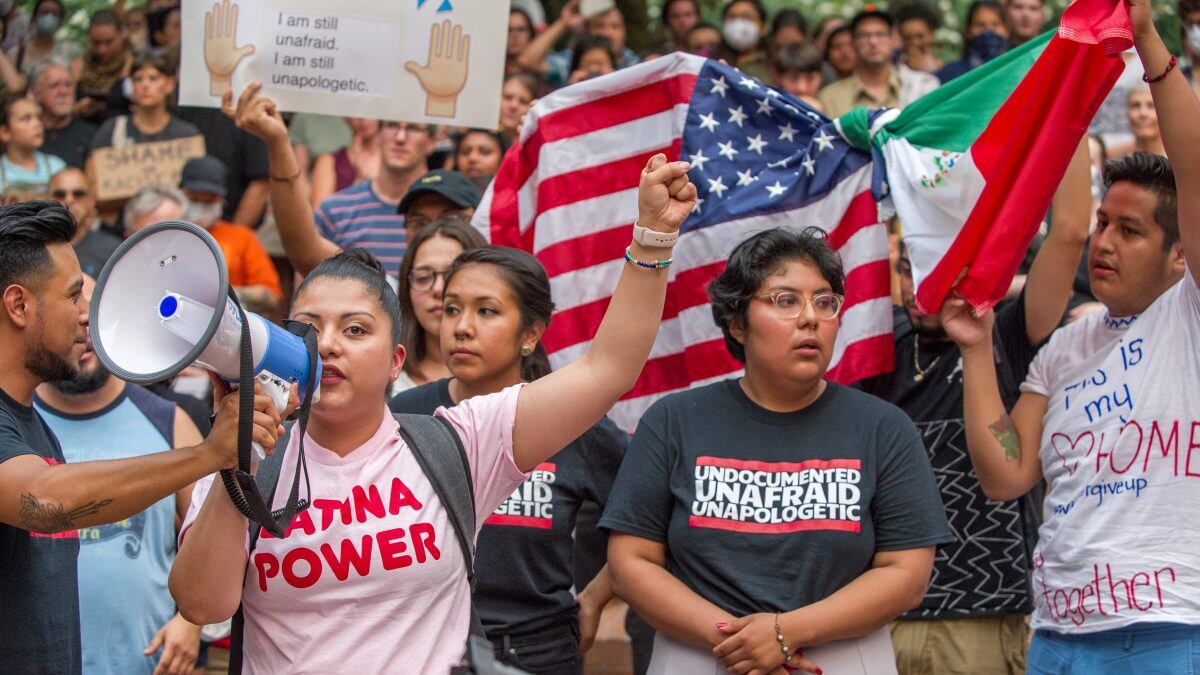Deportations, sanctuary and a possible end to the Deferred Action for Childhood Arrivals, or "Dreamer," program are the big issues facing undocumented immigrants in the United States.
But people in Portland's Latino community say immigration often takes a back seat to poverty's daily grind.
"Suben las rentas, y quieren pagar menos, what the fuck?" a man named Marco says, in perfect Spanglish: Rent's going up, employers pay less.
Standing on Aug. 30 outside the offices of workers' rights organization Portland Voz near the corner of Northeast Everett Street and Grand Avenue and a cluster of tents next to the I-84 freeway ramp, Marco is one of a dozen esquineros who tell a similar story. (The word translates as "guy on the corner," but also "day laborer.")
Most speak Spanish, or Spanglish, and some decline to give a last name. Some are citizens; others have "green cards" or work visas, or are undocumented.
Antonio says he's renting a living room in Gresham de palabra, by word of mouth, meaning no signed rental contract. "When you don't speak much English, [apartment managers] take advantage of you," he says. "They don't think you're going to defend yourself."
The esquineros' words help answer a conundrum found in the most recent homeless count released in June: Despite high poverty levels among Multnomah County's Latino population, only 10.2 percent of local homeless people counted were Latino—fewer than the group's 11.1 percent of the county population.
The statistics suggest Latinos—the largest immigrant group and largest group of non-native English speakers in Oregon—aren't often homeless in Oregon's most populous county.
Todo lo contrario, say people in the Latino community. They're homeless, but less likely to sleep in a tent or doorway. So their struggles may be more hidden.
Joaquin Pastor, a manager at El Programa Hispano Católico, says the U.S. Department of Housing and Urban Development definition of homelessness—sleeping in shelter or places "not meant for human habitation"—counts only the tip of the iceberg. In fact, Pastor says, "a lot of [Latinos] are doubled up," meaning they have no signed lease, and may be "unauthorized guests," in property management parlance.
Pastor says his organization is encouraging people to share units, "but do it in such a way that they're actually on the lease, so the landlord is not able to evict them."
Executive director Romeo Sosa of Portland Voz says half his agency's clients are homeless: 20 percent in shelters, 20 percent on the street, 10 percent in cars. He notes that many travel lightly, with a few basics in a small backpack, rather than pushing a shopping cart.
"Homeless Latinos, they're always thinking to get a home immediately," Sosa says. "They just stay on the streets for a little bit, try to get a job and move forward."
Several Latino housing experts point to another factor: The strength of extended family bonds in Hispanic culture makes it more likely someone with unstable housing is living with family, not in a shelter or tent.
"We are Latinos, we live in big families, so we help each other," says Cristina Castaño-Henao, a housing retention coordinator at JOIN. "It is not just one kid. So the struggle is different."
But the same cultural traditions that help keep Latino people off the street also make finding a decent apartment harder.
That extended family structure can make it harder for Latinos to access small apartments like "single room occupancy," studio or one-bedroom. Castaño-Henao pointed out that many local affordable housing units have smaller unit sizes.
Portland Housing Bureau spokeswoman Martha Calhoon showed WW a breakdown of the bureau's inventory of affordable units by bedroom size, which shows 26 percent of the apartments are two-bedroom or larger—10 percent are three- or four-bedroom.
The draft policy framework for the city's new $258 million housing bond calls for "50 percent family-sized units (two- to three-bedroom)."
Lately, Sosa and others say, housing discrimination has become more frequent, and brutal: "Before, they just like try to hide, but now it's more I think they can openly discriminate against people who are brown or speak a different language."
The net result may be a city in which Latinos are pushed farther to the urban fringes and more apartments pack more people in.
"That's the future for poor America," Pastor says.
Pepe Quiroz, another esquinero, has been homeless for the past four of his 23 years in the U.S. At the end of August, a man leaned out of the cab of a semi-trailer truck and offered Quiroz, 38, his empty soda can. Quiroz declined.
"I say, 'I don't need cans, I need a job,'" Quiroz recalls. "He say, 'Fuck you, go back to Mexico!'"
Quiroz reported the interaction to police. "I've never seen someone be so racist," he says.

Down and Out in Portland, Oregon is a weekly feature that answers the city's most pressing questions about homelessness by taking them to the people who know the issue best: those living on the streets. Look for a new installment weekly throughout the summer.

